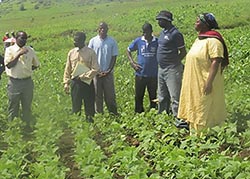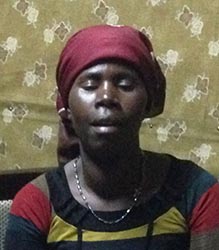When farmers are empowered with knowledge on N2Africa technologies, this information can be disseminated to others. One of the strategies to disseminate research results of N2Africa at scale in South Kivu, Eastern DRC, has been the training of students of agriculture high schools in the N2Africa action sites. The trained students in turn train households in their villages. This article contains the stories of three farmers about how the learned about N2Africa’s technologies and the impact on their livelihoods.

Appoline Mapendo I am now expert in the technique of intercropping cassava, maize and beans with recommended spacing: either 1 m x 1 m or 2 m x 0.5 m. These crops are the most important in my village which is why we were very interested of these technologies. From less than an hectare, we obtained 400 kg of beans, 1 ton of cassava and 1 ton of maize. From my cassava harvested I obtained a 500 US dollar benefit and with this I bought a cow and four goats and presently that cow has given me one calf.” |

Déogratias Bulonza |

M’Mironyi Josephine Nabandi M’Mironyi Currently, I have a field of 2 ha. From a business perspective, my choice focused on soyabean, beans and maize. From my farm I harvest about 1 ton of beans and 700 to 800 kilos of soyabeans per season. In addition to N2Africa’s agricultural practices, we have learned to store our products and sell them when the market price is good. Agriculture has become a true business enterprise that allows me to meet my needs and has transformed my life. I am able to make my own seed stock for the following season. I improved and enriched the diet and the nutritional status of members of my household. I am also able to meet the current needs of my household (health care, clothing, school fees for children of primary school to university). In addition, I have greatly improved my house: from mud huts with thatched roofs to the modern house. I also bought a plot in town (Bukavu). My children who are staying and attending courses at the University will no longer be faced with rent problems. |
